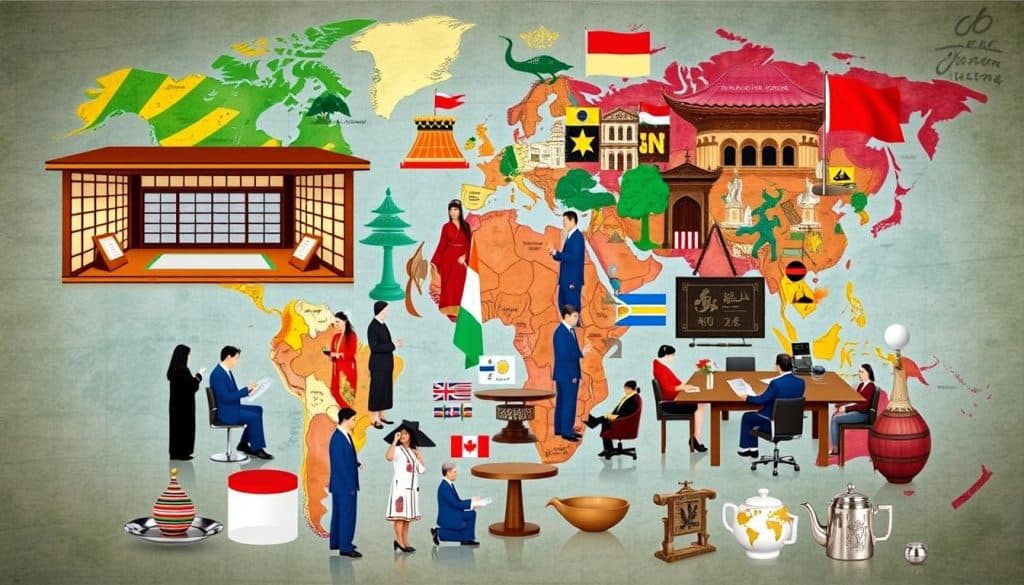In today’s globalised economy, understanding cultural diversity is key for success. As we work in international markets, cultural awareness is vital. It shapes how businesses perform.
Studies show that 70% of businesses see better communication and negotiation when they respect cultural differences. This shows how important cultural sensitivity is in today’s business world.
Looking into different cultures in international business, we see that misunderstandings can cause 40% of cross-cultural negotiations to fail. This shows we need to understand how cultural values affect business.
We will explore how cultural awareness impacts international business. This includes communication strategies and management styles. We will also see how companies can adjust to succeed in diverse cultures.
The Impact of Cultural Diversity on Global Business Success
Cultural diversity is key to global business success. Today, knowing and valuing different cultures is vital for companies to succeed worldwide.
Cultural Sensitivity in Modern Business Practices
Businesses focusing on cultural sensitivity often do well. A study found that 75% of executives think knowing cultural differences helps teams work better together. Also, companies that invest in cultural training see a 45% rise in team satisfaction.

How Cultural Values Shape Business Operations
Cultural values greatly affect how businesses operate globally. For example, 58% of employees see formal titles as important in some cultures, affecting how we talk at work. Yet, 80% of American businesses prefer to use first names, while 75% of Chinese ones stick to formal titles.
Navigating Cultural Differences in International Markets
It’s crucial for businesses to navigate cultural differences when they grow globally. Companies with diverse teams are 30% more likely to meet their international goals. But, 70% of international failures come from cultural misunderstandings.
To avoid these issues, many UK companies are using localisation and cultural training. For instance, understanding Cyprus’s business culture is key for UK professionals aiming to succeed there.
By embracing cultural diversity and adjusting their practices, companies can open up new chances for growth in the global market.
Different Cultures is Key to Success in International Business
Knowing about different cultures is crucial for success worldwide. Our studies reveal that companies valuing cultural diversity enjoy a 24% higher profit margin. This success comes from better problem-solving, more creativity, and happier employees.
Building Cross-Cultural Communication Strategies
Good cross-cultural communication is key to success in international business. Companies that focus on cultural awareness see a 25% rise in employee happiness. To overcome language barriers and build understanding:
- Use visual aids to increase information retention by 65%
- Implement real-time collaboration tools to improve team productivity by 20%
- Encourage inclusive workplace practices, valued by 87% of employees in cross-cultural teams

Adapting Management Styles Across Cultures
Being flexible in leadership is vital for diverse teams. Companies with diverse leadership are 35% more likely to beat their rivals. To adjust management styles:
- Recognise that almost 95% of directors believe diversity brings unique perspectives
- Foster an environment where culturally diverse teams are 1.5 times more likely to innovate
- Implement diversity training to increase employee engagement and creativity by 20%
Understanding Local Business Etiquette
Knowing local business etiquette is key for strong relationships. Research shows that 70% of executives think cultural sensitivity improves business ties. To navigate cultural differences:
- Research greeting customs and meeting protocols for each country
- Be mindful of gift-giving traditions to avoid unintentional offence
- Adapt your communication style to match local expectations of formality
By focusing on cultural competence, businesses can cut down on misunderstandings, boost team efficiency, and increase customer loyalty. This approach not only improves workplace dynamics but can also raise profits by 10%.
Cultural Variations in Business Practices and Negotiations
Business practices and negotiations change a lot between cultures. In the United States, talks often aim to solve problems and find common ground. But, in countries like Russia and Spain, negotiations are more about winning.
There can be big misunderstandings because of cultural differences. For example, in Japan, saying “That’s difficult” is a polite way to say no. But in America, people might think it means they should keep talking. In Spain, getting a contract signed is key, but in India, building a long-term relationship is more important.

It’s vital to fit in with local customs to do well. McDonald’s in Thailand faced a problem with its American menu. But, by adding local dishes like noodles, they did much better. This shows how important it is to know what people like in different places.
Leadership styles also vary by region. In Scandinavian countries, leaders are expected to be self-starting and flexible. In Latin America, they should be diplomatic. In Northeast Asia and the Netherlands, leaders need to speak clearly and directly.
- Low-context cultures (e.g., UK, USA) prefer explicit communication
- High-context cultures (e.g., Japan, China) rely more on implicit cues
- Countries like Brazil and France fall between these two extremes
Knowing about these cultural differences is key for success in international business. Companies that ignore these differences can fail in global markets. To do well, businesses need to learn about local customs, adjust their plans, and make workplaces that welcome everyone’s culture.
Cross-Cultural Communication and Language Considerations
Effective communication across cultures is key for global business success. We face challenges from language barriers and cultural differences in international markets. Our goal is to develop strategies to overcome these obstacles and build meaningful connections with diverse audiences.
Overcoming Language Barriers in Global Business
Language barriers can greatly affect business operations. Studies reveal that 80% of international companies struggle due to language differences. To tackle this, we offer professional translation services and language training for employees.
Clear, simple communication in multilingual settings is crucial. It helps reduce misunderstandings and boosts productivity.

Non-verbal Communication Across Cultures
Non-verbal communication is vital in cross-cultural interactions. Gestures, facial expressions, and personal space vary widely. Understanding these differences is essential.
70% of global CEOs believe cultural diversity boosts business performance. We stress the need for cultural intelligence training. It can lead to a 30% rise in employee engagement in international roles.
Translation and Localisation Strategies
Effective translation and localisation are vital for global success. Understanding Italian business culture and other local customs is crucial. Localisation adapts content to fit cultural, social, and legal norms of target audiences.
This approach can increase customer engagement by up to 50% in international markets. We focus on developing strategies that consider local idioms, slang, and cultural references. This helps resonate with diverse audiences effectively.
By prioritising cross-cultural communication and addressing language considerations, businesses can enhance their global presence and success. Tailoring communication strategies to local preferences and investing in cultural awareness can lead to better business relationships and increased innovation in diverse work environments.
Building International Business Relationships
In international business, building strong relationships is key. Understanding and respecting cultural differences is crucial. For example, in Japan, ‘nemawashi’ means informal talks before meetings. This is different from the quick decisions made in the United States.
Building relationships across borders needs cultural awareness. In Muslim countries, meetings must consider prayer times and Ramadan. Also, work hours vary greatly. Japan values long hours, while many European countries focus on work-life balance.
Effective networking means adapting to different conflict styles. In the Middle East, conflicts are often solved indirectly. In contrast, the Dutch or Germans prefer direct talks. Aligning HR with local norms creates inclusive workplaces. Studies show 65% of companies with diversity training see better employee engagement and productivity.
For UK companies to succeed globally, they must develop cultural intelligence. This skill helps navigate diverse business environments. Embracing cultural differences leads to growth and innovation in international markets.

